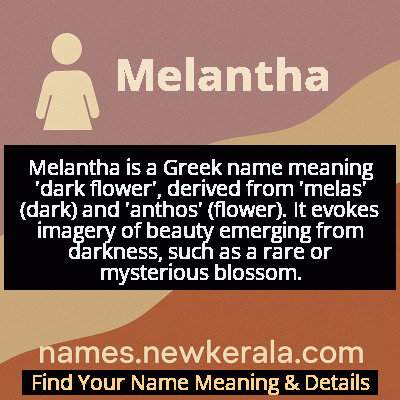Melantha Name Meaning & Details
Origin, Popularity, Numerology Analysis & Name Meaning of Melantha
Discover the origin, meaning, and cultural significance of the name MELANTHA. Delve into its historical roots and explore the lasting impact it has had on communities and traditions.
Name
Melantha
Gender
Female
Origin
Greek
Lucky Number
2
Meaning of the Name - Melantha
Melantha is a Greek name meaning 'dark flower', derived from 'melas' (dark) and 'anthos' (flower). It evokes imagery of beauty emerging from darkness, such as a rare or mysterious blossom.
Melantha - Complete Numerology Analysis
Your Numerology Number
Based on Pythagorean Numerology System
Ruling Planet
Moon
Positive Nature
Diplomatic, friendly, artistic, empathetic.
Negative Traits
Over-sensitive, moody, indecisive, prone to self-pity.
Lucky Colours
Green, cream, white.
Lucky Days
Monday.
Lucky Stones
Pearl, moonstone.
Harmony Numbers
1, 3, 4.
Best Suited Professions
Diplomats, mediators, caregivers, artists.
What People Like About You
Cooperative spirit, friendliness, artistic talent.
Famous People Named Melantha
Melantha from Marriage à la Mode
Literary Character
Iconic Restoration comedy character known for wit and fashion obsession
Melantha in Greek Mythology
Mythological Figure
Associated with dark blossoms and floral mysteries in Greek traditions
Melantha Blackwood
Contemporary Author
Modern fantasy writer popularizing the name in literary circles
Name Variations & International Equivalents
Click on blue names to explore their detailed meanings. Gray names with will be available soon.
Cultural & Historical Significance
Extended Personality Analysis
People named Melantha often develop personality traits that reflect their name's dual nature of darkness and floral beauty. They tend to be introspective and deeply thoughtful, possessing an innate understanding of life's complexities and contradictions. This emotional depth makes them excellent listeners and trusted advisors, though they may sometimes struggle with balancing their rich inner world with external demands. Their creative abilities are typically well-developed, whether expressed through artistic pursuits, problem-solving, or innovative thinking. Melanthas often exhibit remarkable resilience—like flowers that push through dark soil to reach the light, they demonstrate strength in overcoming challenges and adapting to changing circumstances. Socially, they may present as initially reserved or mysterious, but reveal warm, loyal, and deeply caring natures to those they trust. Their combination of sensitivity and strength makes them particularly effective in helping professions, creative fields, or leadership roles where emotional intelligence is valuable. Many develop a unique personal style and aesthetic sense that reflects their appreciation for beauty with depth and meaning.
Modern Usage & Popularity
In contemporary naming practices, Melantha occupies an interesting niche as a name that is both classical and distinctive. While it has never reached mass popularity, it has shown steady growth in the 21st century, particularly among parents seeking names with literary credentials, Greek origins, and meaningful depth. Current usage patterns show it's most popular in English-speaking countries with strong Greek cultural influences, such as Australia, the United Kingdom, and parts of the United States with significant Greek diaspora communities. The name benefits from several modern naming trends: the preference for names ending in '-a' for girls, the popularity of mythological and nature-inspired names, and the growing interest in unique but pronounceable names. Social media platforms and online baby name communities have significantly increased Melantha's visibility, with many parents sharing their choice of the name and its positive reception. The name maintains an air of sophistication and intelligence while avoiding being overly common or trendy, making it appealing to parents who want their daughter to have a name that stands out without being difficult to wear.
Symbolic & Spiritual Meanings
Symbolically, Melantha represents one of the most profound name meanings in the Greek naming tradition—the concept of beauty emerging from darkness and complexity. The 'dark' element carries multiple symbolic layers: it represents the fertile darkness of soil from which life springs, the mysterious depths of human consciousness, the wisdom gained through difficult experiences, and the protective covering that allows true beauty to develop fully before being revealed to the world. The 'flower' symbolism encompasses not just physical beauty but the entire lifecycle of growth, blooming, and eventual transformation. Together, these elements create a powerful metaphor for personal development—the idea that our most beautiful qualities often grow from our most challenging experiences. In psychological terms, Melantha symbolizes the integration of shadow and light within the human personality, representing wholeness and authenticity. The name also carries ecological symbolism in modern contexts, representing the importance of biodiversity and the unique value of less common natural forms. For many, it symbolizes hope and resilience—the certainty that beauty will emerge even from dark circumstances.

